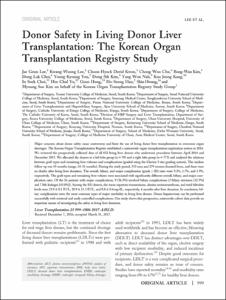Donor safety in living donor liver transplantation: The Korean organ transplantation registry study.
- Keimyung Author(s)
- Kang, Koo Jeong
- Department
- Dept. of Surgery (외과학)
- Journal Title
- Liver Transplantation
- Issued Date
- 2017
- Volume
- 23
- Issue
- 8
- Abstract
- Major concerns about donor safety cause controversy and limit the use of living donor liver transplantation to overcome organ shortages. The Korean Organ Transplantation Registry established a nationwide organ transplantation registration system in 2014. We reviewed the prospectively collected data of all 832 living liver donors who underwent procedures between April 2014 and December 2015. We allocated the donors to a left lobe group (n = 59) and a right lobe group (n = 773) and analyzed the relations between graft types and remaining liver volumes and complications (graded using the Clavien 5‐tier grading system). The median follow‐up was 19 months (range, 10‐31 months). During the study period, 553 men and 279 women donated livers, and there were no deaths after living liver donation. The overall, biliary, and major complication (grade ≥ III) rates were 9.3%, 1.7%, and 1.9%, respectively. The graft types and remaining liver volume were associated with significantly different overall, biliary, and major complication rates. Of the 16 patients with major complications, 9 (56.3%) involved biliary complications (2 biliary strictures [12.5%] and 7 bile leakages [43.8%]). Among the 832 donors, the mean aspartate transaminase, alanine aminotransferase, and total bilirubin levels were 23.9 ± 8.1 IU/L, 20.9 ± 11.3 IU/L, and 0.8 ± 0.4 mg/dL, respectively, 6 months after liver donation. In conclusion, biliary complications were the most common types of major morbidity in living liver donors. Donor hepatectomy can be performed successfully with minimal and easily controlled complications. Our study shows that prospective, nationwide cohort data provide an important means of investigating the safety in living liver donation. Liver Transplantation 23 999–1006 2017 AASLD.
- Keimyung Author(s)(Kor)
- 강구정
- Publisher
- School of Medicine (의과대학)
- Citation
- Jae Geun Lee et al. (2017). Donor safety in living donor liver transplantation: The Korean organ transplantation registry study. Liver Transplantation, 23(8), 999–1006. doi: 10.1002/lt.24778
- Type
- Article
- ISSN
- 1527-6465
- DOI
- 10.1002/lt.24778
- Appears in Collections:
- 1. School of Medicine (의과대학) > Dept. of Surgery (외과학)
- 파일 목록
-
-
Download
 oak-2018-0002.pdf
기타 데이터 / 199.5 kB / Adobe PDF
oak-2018-0002.pdf
기타 데이터 / 199.5 kB / Adobe PDF
-
Items in Repository are protected by copyright, with all rights reserved, unless otherwise indicated.